Four Brothers is a gripping, gritty, brutal, emotionally powerful action-packed urban drama from Oscar-nominated director John Singleton (who reached success with his debut drama Boyz n the Hood). Unfortunately, upon release I judged the book by its cover and awarded this film the dismissive cold shoulder with little intention of approaching it. I didn't know much about the plot, but nonetheless the poster looked stale and didn't flare an interest in my mind at all. As it turns out, Four Brothers is an exceptional crowd-pleaser that surpassed all my expectations.
The film is a testosterone-fuelled drama with an equal mix of humour, action and drama. This is the furthest thing from your typical fluffy action film that boasts someone like Van Damme or Steven Seagal as the film's primary acting talent. There is violent action aplenty (one of the film's primary action scenes I already want to see again), but what makes this film so excellent is that it's not just a string of continuous action scenes. The filmmakers also boast an impressive amount of emotionally-driven moments that are fuelled by the powerhouse performances. From a simple plot synopsis, one would probably think that this is a straightforward, predictable clichéd-ridden story of achieving retribution. On the contrary, the results are simply stunning: director John Singleton has great skills when behind the camera, bringing this action-packed drama to life with visually remarkable consequences. The film is well-paced, taut, stylised and violent - the filmmakers never attempt to hold back on displaying heavy violence and bloodshed.
In essence, Four Brothers is a modern-day Western. But this is not your ordinary Western: this is an urban-infused, Western-style drama set in the inner city of snow-gripped Detroit. The typical spaghetti Westerns would portray a lone gunman riding into town to face the bad guys head-on. In this case, the film trades in the single gunman approach and instead places four men as an alternative. The four central protagonists are the adopted Mercer brothers: two white, two black - Bobby (Wahlberg), Angel (Gibson), Jeremiah (Benjamin) and Jack (Hedlund). After the brothers lived through their childhood, they all went their separate ways. Their mother is a much respected elderly citizen named Evelyn Mercer (Flanagan). Evelyn is a well-liked lady with a penchant for helping the lives of troublesome young kids. One night, Evelyn's tranquil life is disrupted when an apparent grocery store robbery results in her being gunned down in cold blood. Her funeral attracts the four brothers who hadn't been together since their childhood period concluded. These estranged brothers reunite and seek revenge on whoever is responsible for the murder of their mother. The police don't appear to be doing anything to solve the case, so the brothers take the law into their own hands and commence their pursuit for justice.
As the plot thickens and the investigation lengthens, it becomes apparent that the "accidental death" of their mother might not have been unintentional after all.
Four Brothers is visceral filmmaking that satisfied my every requirement for entertainment. Like I stated previously, the film has lots of action but it's not a ludicrous string of action with no heart. At the core of the film there is heart and an important sense of camaraderie. Running at approximately 100 minutes, the film successfully packs one heck of a wallop! It's tightly edited and encompasses a lot to examine underneath while not spending an overwhelming amount of time on unnecessary drama. To establish the characters there's no extensive dialogue scene; instead they are introduced when they are being reunited at the funeral and the cops discuss the history behind each individual. Without being corny or poorly written, this is an extremely creative way to feed the audience everything they need to know before proceeding into the nitty gritty.
I was especially fond of the atmosphere the film creates. The use of carefully-chosen music (mainly hip-hop) gives the unmistakable impression of an unsavoury neighbourhood. Leave it up to John Singleton: a man who completely understands the style, genre and background. You can also expect a thread of unpredictability: the audience will be lead down a continuous path of red herrings until the film's wholly satisfying conclusion. Another completely admirable element is that the filmmakers are not afraid to be relentless. One character is treated with about as much sentimentality as the next. They're never afraid of the consequences when one man is killed off.
One of the main qualities of the film is the strong sense of companionship and solidarity between the four lead characters. Mark Wahlberg is an outstanding actor who infuses a sense of brutality and conviction in his portrayal. So to speak, his role is that of the older brother who feels compelled to be an authority figure for his younger siblings. Wahlberg's character Bobby is able to endeavour an older-brother-type take-charge attitude that helps bring his three brothers together in their search for their adoptive mother's killers through the callous streets of Detroit. This is a veteran Hollywood actor amidst a fundamental cast of unknowns who mainly have a background in the music industry (a notable fact is that Wahlberg also has a past in the music business). Tyrese Gibson, Andre Benjamin and young Garrett Hedlund are the other three brothers who appear to be equally as concentrated as Wahlberg. All four actors deliver amazing performances and fall squarely into the "anti-hero" category. The excellent chemistry between the four leads adds to the feel of the film. Altogether they are the Western-style lone gunman out to execute the guilty party. Terrence Howard and Josh Charles are both quite extraordinary as the cops who aren't willing to allow the four brothers to exercise their own form of street justice.
Overall, Four Brothers is a film one would never expect to be so excellent. At the end of the day it's only flawed faintly in the script department in the sense of over-length and a few hollow lines of dialogue. Okay, I know what you must be thinking. Rappers being actors...doesn't sound too promising does it? Before I watched the movie I must admit I was afraid of this and the thought that the film might be drowning in hip-hop music that will make you want to slice your ear-drums out! You don't need to worry at all, as Four Brothers does not submit to these anticipated flaws. The film is a compelling drama permeated with an equal dosage of humour, drama and action. To quote a reviewer, this is a "gritty urban drama". Bottom line: an excellent Friday night at the movies!
8.2/10
Gripping, brutal urban drama!
 Posted : 17 years ago on 16 June 2008 06:42
(A review of Four Brothers)
Posted : 17 years ago on 16 June 2008 06:42
(A review of Four Brothers) 0 comments, Reply to this entry
0 comments, Reply to this entry
Effective Aussie film
 Posted : 17 years ago on 15 June 2008 10:17
(A review of Wolf Creek)
Posted : 17 years ago on 15 June 2008 10:17
(A review of Wolf Creek)90 percent are found within a month.
Some are never seen again."
Wolf Creek is tagged as "based on true events". This statement is in the same vein as tagging the cult favourite 1974 horror film The Texas Chainsaw Massacre as "based on true events". Essentially, the core of the concept of Wolf Creek is inspired by the serial killer Ivan Milat who brutally slaughtered backpackers from different parts of the world. Writer/director Greg McLean utilises these murders as the foundation for this low-budget Aussie horror film. In 2005, audiences welcomed such horror films as Hostel: a film that was nothing more than torture porn and an excuse to showcase gory mutilations. When it comes to a film like Wolf Creek, I was afraid that the Aussie filmmakers would yield to the typical flaws of the horror genre. Fortunately, the final results are brimming with superiority and tower over such horror porn as Hostel or some of the Saw sequels.
The opening few minutes introduce us to the three main protagonists. The title sequence runs a whopping 11 minutes! That's 11 minutes to set up the characters and establish the journey ahead of them. Two British backpackers named Liz (Magrath) and Kristy (Morassi) agree to travel across outback Australia with their Aussie mate Ben (Phillips) who originally lived in Sydney. They are all in their early twenties and enjoy the pleasure of each other's company. On a minuscule budget they purchase an old bomb of a car which they plan to use as transport to visit tourist sites of the outback. The first stretch of their journey is through the scenic Wolf Creek National Park. In the first few days of their trip, their car breaks down in the middle of the desert. Soon a seemingly friendly bushman with sinister intentions (Jarratt) enters their lives. For Liz, Kristy and Ben the trip was supposed to include many days of great fun in good company. However this soon turns into a dark, horrifying nightmare when they become unwilling participants of torture and dismemberment by a man with a sick mind.
The first time I watched Wolf Creek I hated it. My maturity at the time reflected the kind of films I enjoyed viewing. After I tremendously enjoyed McLean's next feature, Rogue, I felt it was time to revisit the roots of McLean. The second time around I was alone in a dark room when it was late at night. It's a lot more effective when one grows and matures. I'm surprised that the reviews were such a mixed bag when the film was initially released. I admit that when I first saw the film I favoured the negative reviews, however as the film grew on me I became more fond of it. The atmosphere of terror and dread is effectively established half-way through the movie.
The first half lets the audience familiarise themselves with the characters. Some critics disliked this character development. Personally as we see the characters having a casual chat, I found the characters more likable. This first half is more of a drama that has many scenes of absorbing dialogue. I particularly liked the atmosphere. Be it the audio mix that clearly represents the true sounds of the outback, the fascinating shots of animals and plants or the down-to-earth realism; this is an exemplary method to portray my home country. After this atmospheric drama, McLean has the viewer at ease with what is occurring. He has the viewer exactly where he wants them: liking the friendly characters, and under the impression that nothing can happen to them. This is effective when McLean unleashes relentless mayhem and violence.
The film flaunts performances from a bunch of almost-actors. Being a low-budget Aussie film, the filmmakers couldn't afford actors with an impressive reputation. John Jarratt plays his role wonderfully. There's a great deal of subtlety in his portrayal: representing a deranged bushman who kills tourists for pleasure. His over-the-top characterisation of Mick Taylor is nothing short of amazing. Apparently Jarratt is a method actor who stayed in character throughout the duration of the shoot, even when the cameras weren't rolling! Cassandra Magrath and Kestie Morassi had trouble convincing me in their portrayals. The first half particularly lacked anything spectacular. Nathan Phillips is talented at portraying Ben. Phillips comes across well as a simple Aussie bloke trying to impress his girlfriends with his simple laid-back Aussie traits while a budding romance is a possibility. Phillips disappears into the second half as that section of the film is more concerned with his female companions suffering through the anguish inflicted by their tormentor.
Wolf Creek isn't just torture porn like, say, Hostel. The gore and violence is a little senseless, but even so there are a number of real scares. The chilling atmosphere drawn from Jarratt's creepy laugh is especially effective. Okay, so I'm part of the minority that enjoyed the film. I have no shame in admitting that. On the whole the film is frequently terrifying and although slightly clichéd, it didn't succumb to many of the genre conventions one would expect. Unlike Hollywood horror movies, the film doesn't rely merely on the blood and gore: there is also suspense and tension which is vastly more effective. This disturbing film is a must for horror buffs.
6.9/10
 0 comments, Reply to this entry
0 comments, Reply to this entry
Shyamalan is back!
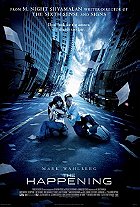 Posted : 17 years ago on 15 June 2008 06:15
(A review of The Happening)
Posted : 17 years ago on 15 June 2008 06:15
(A review of The Happening)
As of 2008, it has been nine years since M. Night Shyamalan made his mark on the thriller genre with his 1999 hit The Sixth Sense. Director/writer Shyamalan proved that he is able to create some intriguing concepts and bring them successfully to the big screen. Unfortunately, from there it has been nothing but downhill for the director. In the years to follow the world witnessed the release of many more of his movies, many sinking without a trace. Signs is the only film of Shyamalan's that is almost on par with The Sixth Sense. Speaking rather forthrightly, Lady in the Water is genuine crap!
So how does The Happening hold up during Shyamalan's pursuit for redemption? Well, after reading the negative response from critics and audiences alike, I was already disappointed in one of Hollywood's most potentially talented directors. Hence, my view of the film was tainted when I walked into that cinema.
The Happening deals with an alarming prospect that is extremely plausible in this current era of humankind. In all honesty, I feel that humans could be in their final act. After populating the planet for so many years and causing gross amounts of pollution, our planet may be fed up with our selfish actions and perhaps is planning to exterminate us. Shyamalan takes this credible, distressing concept and uses it as the foundation for the film's plot. Shyamalan steadily paces the film and uses absorbing cinematography, dialogue, and media reports; letting the indisputable possibility sink into the minds of the audience. After all, we have been treating our planet so appallingly since the beginning of time...what if Mother Nature demands revenge? What would you do if the greenery of the surrounding land started releasing chemicals and toxins to bring about your demise?
The film opens as the event occurs. We are thrown straight into the action as disorientated people begin committing suicide: people stab themselves, workers throw themselves from construction sites, policemen shoot themselves through the head...and no-one has a clue why this is happening. Naturally in today's society the immediate initial thought is that a terrorist attack in unfolding. The cause of the suicides is ascertained to be the result of a dangerous neuro-toxin gas being deployed from an unknown source. The clueless population are ordered to commence the evacuation of all major cities that have been affected.
Cut to a simple school where we are introduced to Elliot Moore (Wahlberg): a teacher who excels in the area of science. The school learns of the neuro-toxin gas outbreak and are forced to evacuate the premises. Elliot leaves his home with estranged wife Alma (Deschanel) as they head for the smaller suburban towns, under the impression that this "terrorist attack" (as the media are calling it) would not be targeting the insignificant parts of the country. But reports of people being affected by the gas begin stretching to smaller towns where people are now fleeing. It soon becomes clear as the body count rises that the odds of a terrorist attack are declining sharply. The central plot branches off into numerous sub-plots as the protagonists rapidly relocate in an attempt at survival.
For those expecting a Shyamalan "twist in the tale", forget about it. There are a few interesting twists as the plot builds, but nothing major that will force you to cover your mouth in shock. There is no twist ending...in fact there is essentially no ending. On the whole, the film feels really incomplete. I felt that everything was wrapped up nicely until the film's final scene that will leave the audience feeling disgruntled and dissatisfied. There are far too many endings as well. At least 5 times there is a fade out...then it just cuts to another scene. The critics and audiences alike are feeding the film nothing but pasting and criticism mainly because of this. I am in the gross minority by saying this, but I liked the ending. The film manages to stay away from the clichés and conventions. People rely too heavily on "feel good" happy endings. If a natural event like this did occur, the chances are minute that it would actually cease. I admire Shyamalan for making a very different and unique horror movie.
I expect that because this film was released during the summer season (the American summer season, that is) people will attend a screening with hopes of seeing something like Iron Man. This film's rating will certainly reflect the maturity one must reach to watch the film. If you're in your early teen years you'll be expecting something eventful and action-packed, I presume. My advice: stick with The Incredible Hulk and Iron Man so I won't have to hear your mindless rambling. In my opinion, Shyamalan's approach of developing a fascinating plot is more intriguing than a clichéd, predictable Marvel action film.
Shyamalan uses captivating shots of the surrounding landscape. His trademark cinematography techniques are disturbingly effective. The director is skilled at creating an atmospheric thriller/horror film. Whenever people are affected by the gas, there is plenty of opportunity for you to scream. I found the suicide scenes to be eerie and unsettling. With Shyamalan being granted permission to make his first film to be classified R by the MPAA, you can expect blood and corpses. But also assume something different and unique: a film that is slow-paced but requires patience. Don't anticipate the typical clichés to surface.
Similar to everything else in the film, the performances are a little different. Mark Wahlberg delivers a unique performance unlike anything we've seen him tackle before. His dialogue delivery reflects the established atmosphere of the movie. Zooey Deschanel and John Leguizamo further support this previously instituted atmosphere. They usually look zoned-out and drained of emotion; however I would expect that this is how people would react if something bizarre like this actually occurred. No-one would have a clue what to do. The film manages to stay away from the conventional riots and looting that would occur in your typical epic thriller. One of my complaints about the film is in the script. Some of the dialogue feels contrived and is occasionally very dumb. Also, we're thrown into the action immediately without developing the characters. Why are we supposed to care about them? With an extra 20 minutes of character development dropped in front of the rest of the movie, the results would have been a lot better. Not to mention almost no chemistry between the leads. Towards the film's conclusion, things get extremely silly as well.
Overall, The Happening is a film that I expected more from. Shyamalan could have done a lot more with the incredible potentiality of the concept as its execution is merely average. I certainly liked it more than some of the critics, probably because I enjoy this genre and admire uniqueness.
At the end of the day, people approach a Shyamalan film expecting scares and a tense atmosphere...but above all looking for something different. On that note, the film delivers. It's slow-paced and not very rewarding in the end, but at least I was entertained and rather enthralled from start to finish. The score by James Newton Howard mixed with spellbinding cinematography is bound to impress. I am very aware that I am in a select minority of praising the film, but I am gladly in that minority. The bottom line: the film delivers an important message that is relevant to current society. It is also suspenseful, atmospheric and eerie. The haters evidently just don't understand the movie.
7.3/10
 0 comments, Reply to this entry
0 comments, Reply to this entry
Absorbing Great Depression-era drama!
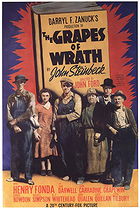 Posted : 17 years ago on 14 June 2008 01:30
(A review of The Grapes of Wrath)
Posted : 17 years ago on 14 June 2008 01:30
(A review of The Grapes of Wrath)
Based on the novel by John Steinbeck, The Grapes of Wrath is a classic film that takes an honest and uncompromising look at life during the period of the Great Depression. This is an important film as it captures the humanity of the period with poor families drifting from town to town in search of a job to hold down in order to feed their family.
But transferring Steinbeck's successful novel to the screen was no easy task. In the years preceding the film finally being made, the novel had been the subject of much debate and concern. As it takes a political siding, the government were infuriated as were farm interest and banks. When the proposed film adaptation got off the ground, there was a call to boycott all films reeled out of Fox studios. The film company took great measures to assure the public that the film wasn't taking any sides; however the result blatantly sides with the poor farmers who suffer through the greed of corporate business. In a sense, the determination that is displayed in the film also represents the determination to get the film made! After the film's eventual release, Steinbeck himself proclaimed his admiration of Ford's adaptation of his novel, saying that it had "a hard, truthful ring. No punches are pulled. In fact, it is a harsher thing than the book by far."
The Grapes of Wrath is a film concerned with the Joad family from Oklahoma. A combination of callous droughts and unsympathetic bankers result in sharecroppers being compulsorily forced to abandon their homes and their land that has been their property for generations.
The film opens as young Tom Joad (Fonda) returns home after a 4-year stint in the penitentiary. He expects to come home to find his loving family welcoming him home with open arms. Instead he discovers the impact of the harsh conditions that his family are suffering through. After Tom reunites with his family and is informed of the present situation, they are soon faced with no prospect of government aid and the serious likelihood of starvation. They answer the call of quickly-circulated handbills claiming the necessity for 800 pickers in California. Similar to thousands of other despondent individuals, they pack up the family and head in the direction of California. This journey is an emotional burden on the family who begin losing people to sickness or natural causes. But worse has yet to come. After the family reach the "Golden State" with the intention of settling down, a jarring reality dawns on them: too many migrant farmers with an adequate amount jobs being offered.
The film is then the story of the family overcoming the appalling conditions they are being succumbed to. This includes terrible treatment in camps and even in housing meant for the workers to live in. An interesting fact: the studio approached this adaptation after sending private detectives to investigate the conditions in camps to ensure Steinbeck hadn't exaggerated the situation. As it turns out, conditions were worse than described in the novel.
The Grapes of Wrath is truly uncompromising and brutal. This is not the usual Hollywood fare of happiness, but tragedy that besets the family from the outset. Do not expect a happy, satisfying conclusion as the film never even tries to hint that one is being built up to. It's not like the filmmakers could portray so many more problems the family encounter for the rest of their lives. On that note, some titles to wrap up the film's story could have heightened the film value. Even though the film may be depressing for some, the film is also uplifting as it takes an absorbing look and the spirit, compassion and determination of humankind.
Henry Fonda's performance is another aspect of the movie that highlights the human spirit in terrible situations. Fonda embodies the common man who is just trying to do what's best for his family. Towards the film's conclusion his performance should have you close to tears. Through the course of the story, Tom cultivates an interest outside himself: an inclination to stand up to the giants of oppression and fight for the rights of the little man. He becomes, in other words, a hero in every sense of the word.
My only complaint of The Grapes of Wrath is its failure to maintain my interest during its lengthy running time. At the end of the day it took so long to say so little. It outstays its welcome, and has too many burdens on the film's central plot. When the family moved to another location I was thinking "Oh no, here we go. They'll be leaving this place heartbroken in no time". It's an outstanding movie of course and an important one at that, but a shorter running time could have benefitted it.
Overall, The Grapes of Wrath is a very important piece of cinema history. With its genuinely absorbing look at life during the Great Depression and some great underlying themes, this is indeed a splendid achievement. The results convey a realistic atmosphere, and it delivers a strong political message while also being a warm human drama. The film is inspiring and touching; a story of family togetherness, family separation, and the requirement for unity among all people.
8.1/10
 0 comments, Reply to this entry
0 comments, Reply to this entry
A distinctive, landmark vampire movie!
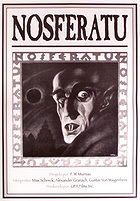 Posted : 17 years ago on 14 June 2008 08:45
(A review of Nosferatu)
Posted : 17 years ago on 14 June 2008 08:45
(A review of Nosferatu)
F.W. Murnau's 1922 silent film Nosferatu is a groundbreaking masterpiece of the vampire genre: a truly fascinating film that is the essential blueprint for all vampire movies that were to follow. Murnau fundamentally gave birth to the horror genre with this silent film from the German Expressionism era of filmmaking. At the time of release, no moviegoers had ever experienced this genre embodied on film. In essence, this film contains all the exemplary vampire components and is still the archetypal vampire movie experience.
The story is based on Bram Stoker's classic novel Dracula, but director Murnau was unable to get the rights to the novel. Not willing to accept defeat, Murnau made 'cosmetic' changes to pass it off as his own creation. However after the film's release, Stoker's widow perceived that it was a blatant version of her late husband's novel and sued the filmmakers. As a result, the studio went broke (this was the studio's only movie) and the settlement resulted in an instigated court order to have all copies of the film destroyed. Obviously, not all copies of the film were thrown onto the fire. Thankfully, a limited supply of original film negatives actually still exist and can still be exhibited. Said negatives (that is, primary copies of the film that were originally distributed in 1922) that survived the fire are now a prized possession among film buffs and cinema collectors.
Recently the film underwent a massive restoration effort: missing frames and missing scenes were collected from all over the world to be inserted back into the final film and create the definitive Nosferatu experience. Over the years, cheap cut versions running at 70 or 80 minutes were common. This restored version runs over 90 minutes and is never boring for a second.
Gustav von Wangenheim plays Thomas Hutter: a successful realtor who works for the town's local real estate agent. Count Orlok (Schreck) from an isolated castle in Transylvania expresses interest in the acquisition of a house in the peaceful town that Hutter inhabits. Hutter is given the overwhelming assignment of travelling to Transylvania to complete the transaction, but as he draws nearer to the castle he begins to comprehend the genuine malevolence he is walking into. Hutter realises that merely mentioning Count Orlok's name is enough to arouse fear and dread in the local townspeople. While Hutter resides at the castle he discovers quite a bit regarding the true identity of Count Orlok...also known as Nosferatu the vampire. Orlok travels to Germany to live in his new house, said journey causing the deaths of all the crew of the ship he was on. As this terror unfolds, Hutter frantically hastens home to save his beloved wife Ellen (Schröder). Little does Hutter realise that Orlok has developed an obsession with Ellen and wants to have her under his spell. To tell you even more would be unimaginable...
This symphony of horror is the original archetypal film. Over the years it has succumbed to rotten spoofs, remakes and retakes on the story. Nosferatu accurately portrays the potency of the fear of vampires throughout the 19th century. Around this time they were portrayed as seductive and were metaphors for transmitting sexual diseases. These prominent sexual themes sparked controversy at the time of the film's release. In the film there is also frequent mentioning of rats and vampires spreading the bubonic plague. Throughout the 19th century, the plague was a tremendous worry (the last massive outbreak of the plague was as late as the 1890s).
The film is crafted to perfection by F.W. Murnau. Behind the camera Murnau's determination was palpable. Whenever the camera rolled, everything in his frame was used to great effect. He employed extreme expressionist angles that effectively create anxiety and intrigue in the viewer.
Max Schreck is one of the most terrifying and ugly screen vampires of all time. Even with modern make-up technology it is an extremely daunting task to replicate the realism of Schreck's animalistic features. When I first saw Schreck walk into frame...I found it difficult to breathe and chills ran down my spine. His appearance is truly terrifying. If you don't find him scary, you're far too familiarised with Hollywood vampires (I'm looking at you, Brad Pitt and Tom Cruise among many others). This brings me onto a myth that quickly circulated in the decades following the film's release. Legend has it that Schreck was, in reality, an actual member of the undead - a genuine vampire! Ostensibly, director Murnau was so committed to producing the definitive vampire experience that he was willing to risk the safety of his cast and crew by using an actual vampire. During the production, the crew had to deal with crew-members turning up dead or going missing. This is a fact. Even despite this evidence people can be naysayers on the issue. Everyone can draw their own conclusions and judgements on the matter. The prolific myth will never be confirmed or invalidated.
The supporting cast is equipped with a host of talented actors. By today's standard, bored audiences will just laugh at the exaggerated mannerisms and be annoyed at the titlecards which were used for the dialogue. It's very simple: if you think the acting is bad and that silent movies are boring, stick to Hollywood blockbusters please. I'm sick of the usual complaint of "it's just so old" or "it's very boring". Got news for you - you're part of the "four-minute music video generation" and should never watch an actual masterpiece.
Nosferatu is only for those with the patience to sit through 90 minutes of brilliant cinema history accompanied with a sinister score. Beware: only the recent 2006/2007 restored version contains the actual original music (a new recording of it). All versions before that include the appalling techno version and many other poor orchestral compositions. Do not judge the films score until you've seen the latest restoration!
The film flaunts visual effects that were state-of-the-art when first released in 1922, but the impact has slowly disintegrated over the decades. In my opinion, Nosferatu is a riveting horror film deserving of the acclaim and accolades that were to follow over the years. Some will love it, some will hate it. Personally I can understand why some contemporary audiences dislike the film because of its age. Be that as it may, this is the best vampire movie ever made. In the decades to follow, imitations were very regular in the form of blockbusters made for a quick buck. Even TV shows use the premise of vampires in which to create a new tale of vampirism.
Nosferatu will never be tainted in my opinion. Although today it is regarded as clichéd, just remember that this is a film made before the times of clichés: it was the first horror film ever made! Respect its age! On the whole, the film is atmospheric and compelling. It's simple and not complex, but this quote from director Murnau accurately defends this observation: "Real art is simple, but simplicity requires the greatest art". Nosferatu, eine Symphonie des Grauens (the original German title that commonly translates as Nosferatu, a Symphony of Terror) is true art that is hard to match. I studied this film extensively in school. Despite this broad study of the film, I never grew sick of its brilliance. It only heightened my respect. I am truly waxing lyrical when I discuss this legendary horror film.
9.0/10
 0 comments, Reply to this entry
0 comments, Reply to this entry
An enjoyable teen comedy!
 Posted : 17 years ago on 13 June 2008 02:44
(A review of She's the Man)
Posted : 17 years ago on 13 June 2008 02:44
(A review of She's the Man)Paul: "Just remember, inside every girl, there's a boy. That came out wrong but you know what I mean."
She's the Man is the latest contemporary reinvention of a classic Shakespeare play. A few years before, the world witnessed the release of 10 Things I Hate About You which was ostensibly Shakespeare's Taming of the Shrew updated and transplanted into a typical modern teenage society. In tradition with that successful film (that I have no shame in admitting I enjoyed), the screenwriter of She's the Man has taken the foundation of Shakespeare's The Twelfth Night and altered the setting to modern day teenage culture. In this day and age of Hollywood, original plots and concepts are few and far between. It now seems that filmmakers are revisiting Shakespeare's work because his plays have an outward show of convoluted dialogue; however the central plots are absolutely fascinating. Personally I detest studying Shakespeare in depth at school, but his plays have such a rich multi-faceted plot despite the dialogue that cannot be pleasurably interpreted.
Okay, so I admit that I expected something much less from She's the Man. Face it: Amanda Bynes has been inadvertently lumped together with all the other plastics of the industry like Lindsay Lohan, Paris Hilton, etc. Personally my image of Amanda skyrocketed after I viewed this film. No longer was she a stereotyped plastic slut in my eyes. This is good - the lesser the better! In this film Amanda shows that she is capable of actually acting! That's a talent that the plastics of Hollywood would kill for.
She's the Man takes many of the fundamental plot devices of Shakespeare's The Twelfth Night, waters down the societal aspects of the time and substitutes a soccer rivalry between schools to broaden the appeal of the story.
Viola (Bynes) is keen on the sport of soccer. Unfortunately, at her school of Cornwall High the girl's team is cut due to unsatisfactory numbers from the female students. Viola wants to join the boy's soccer team; however this is met with laughter. This is such an emotional burden on Viola that she even ends the relationship with her boyfriend who is captain of the boy's team. Viola wants revenge on the team that rejected her, and forms a plan when she realises her brother Sebastian (Kirk) is secretly skipping the first 12 days of his new school to go to London in pursuit of his ambition in the music industry. Viola and Sebastian are twins and look alike, so Viola schemes to dress boyish and pose as Sebastian at his new school where she can join the soccer team that verses Cornwall High in just 12 days. During these 12 days Viola falls in love with soccer captain Duke (Tatum) who is in love with Olivia (Ramsey) who is falling in love with Sebastian (who is really Viola)...romantic chaos ensues. This complicated love triangle reminds us that this is Shakespeare we're viewing.
The filmmakers have struck success in breathing new life into the Shakespearen play. The screenplay has a few moments of comedy genius. Witty dialogue delivery, amusing lines, etc. On the whole, it felt like there could have been a whole lot more gags included here. In all fairness, most of the film's laugh value is based solely on complicated situations regarding the love triangle. Not really my kind of humour...but I did laugh at times.
Amanda Bynes gives a solid, albeit histrionic performance as Viola. She had a challenging job of pulling off a girl and a guy. She handled the role with great determination. Amanda is really likable in the title role. She's also incredibly cute at times. I don't understand how she is hated and grouped with the Hollywood plastics. Channing Tatum is just another Hollywood pretty boy included for interest from the girl audience. Amanda is included for the guys but at least she can act! A special mention about Vinnie Jones as the very cool soccer coach (Vinnie was formerly a soccer star).
Overall, She's the Man is a welcome surprise that is surely worth viewing. I enjoyed the film. Aside from being clichéd and predictable, it was fun and bright. I'd recommend it for a simple night of fun and laughter.
6.4/10
 0 comments, Reply to this entry
0 comments, Reply to this entry
The 'Worst of 2008' list on its own!
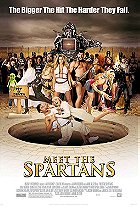 Posted : 17 years ago on 13 June 2008 06:35
(A review of Meet the Spartans)
Posted : 17 years ago on 13 June 2008 06:35
(A review of Meet the Spartans)
Meet the Spartans is a film I wanted to avoid and at the end of the day should have avoided. After the creators of the appalling Date Movie and Epic Movie announced yet another spoof...I was almost in tears. Just spare a thought about the money the duo of Jason Friedberg and Aaron Seltzer have wasted while making these fruitless, futile spoof movies! That could have been enough to fund a few small movies, or altogether could have funded one bigger movie. There's a few potentially decent films we will never see!
In the spoof movie world, there are funny spoofs...and there are Jason Friedberg/Aaron Seltzer spoofs. The former may not produce brilliant results, however they are at least entertaining enough due to the high levels of hilarity that emerge in multiple scenes. The latter...well, you'll be hard-pressed to find the slightest urge to laugh. I have no idea why the talentless duo continues to produce elaborate hack jobs that waste money, time and potential talent. (In this case I'm looking at you, Diedrich Bader. Shame on you for agreeing to star in this mess!)
Meet the Spartans is about as funny as being sexually violated by a horribly disfigured elephant and about as painful. I must give props to the two guys for making the standard for their comedies lower and lower...Date Movie being their best (this is an astoundingly faint praise), Epic Movie resulting in worse results, and Meet the Spartans not only resultant in their worst effort, but possibly the worst film of all time! This is the cinematic equivalent of receiving a very painful enema! How bad are we talking? Well, when I watched the movie I felt sick to the stomach and had to possess a vomit bucket on stand-by. This is a teenager who is saying this...a member of the supposed target audience! Meet the Spartans relies on childish, puerile humour consisting of sometimes insensitive cracks about society and juvenile sex/potty jokes.
I heard reports of people in the cinema yelling out "This is crap!" and other such things. Normally I abhor those who yell stuff in the cinema...but this is an exception. Who am I to quibble? This film is pure crap! It needed to be said.
The film is ostensibly a simple spoof of the hit 2007 film 300. Okay, so the idea of spoofing a highly stylised film adaptation of a graphic novel may seem like a decent idea. There's plenty of material for a raft of clever gags, right? Wrong! The screenwriters only incorporate the obvious and predictable laughs. The pacing is always affected by a scene turning into something from American Idol, Deal or No Deal, Dancing With The Stars, and America's Next Top Model (some of which have been slightly modified to suit the setting). What does this do? It saps all the tension and fast pacing that was set up...instead adding an extra 5 minutes to the already minuscule running time. The film also takes a stab at several other recent movies and even video games! It's all incredibly mindless and pointless! But is it funny? Absolutely not!
Just when you think they've run out of ideas, they decide to spoof Stomp the Yard and have a dancing competition. Then when you've come to the conclusion that things can't get any worse...a competition consisting of people exchanging 'Yo Mamma' jokes! Interestingly enough, they managed to choose the jokes that aren't funny. Yes, it's that bad! But wait...there's even more! You'd think they've run out of ideas, right? It seems they haven't as they incorporate several instances of blatant product placement and commercials. Just like the added TV shows, it slows the pacing and makes the audience even more bored. Worse has yet to come - soldiers walk around the battlefield carrying blue screens to use digital effects to give the impression of a menacing army. In all fairness, I think the filmmakers couldn't find many extras who were willing to be part of the production. If I was offered money to be an extra I wouldn't do it! It'd taint my image, and even if my name was omitted from the credits I would be mentally scarred from so much as stepping onto the set!
In the midst of this cinematic chaos emerges a cast that you feel forced to pity. Carmen Electra's performance always seems to repeatedly reinstate the message to the audience of "I can't act...but I'll always take a role if you want big breasts and zero acting talent!" Sean Maguire never looks committed or convincing. They are supported by a cast that are all standard for the genre. Did they really need the pay-check to suffer through this mess?!
Meet the Spartans only supplied one single line of funny dialogue. But it came in the first minute of the film's running time...thankfully the entire movie only went for about 68 minutes (still too long). I was still forced to sit through over an hour of poorly written gags and a terribly executed screenplay! Then, just when you think the film is finally over, the credit roll is accompanied by the cast singing and dancing followed by a montage of deleted scenes. Ever heard of DVD extras, guys?! This just adds insult to injury!
I'll keep it short, sweet and simple: do not let curiosity get the better of you! There is a line, and Meet the Spartans crossed it. If you ever watch the movie please make sure there is no food in your stomach as it will be explosively hurled in disgust. The movie lacks humour and an entertainment value. The constant stream of parodies are merely based around recent movies and TV programs, and continue to question the viewer's decision to ultimately watch the movie! I can't recall a recent movie I've seen that is worse than this turd on film! In a few years when the potency of the pop culture references have disappeared there won't even be a scrap of laughter to be found. I will never watch this movie again in whole or part, not even if I was paid. Afterwards I felt violated and raped. It gets worse...the same duo are making another spoof film. R.I.P modern cinema!
0.0/10
 0 comments, Reply to this entry
0 comments, Reply to this entry
Light amusement...but nothing further
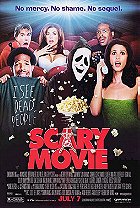 Posted : 17 years ago on 11 June 2008 12:55
(A review of Scary Movie)
Posted : 17 years ago on 11 June 2008 12:55
(A review of Scary Movie)
Every generation deserves its own spoof movie to rule them all. David Zucker's 1980s classic comedy Flying High! (known as Airplane! in America) still remains to be the king of all spoof films. Before him it was Mel Brooks with such films as Young Frankenstein and Blazing Saddles. Despite internet rumours that rapidly circulated, Scary Movie is definitely not the definitive spoof movie of this generation. The film is brisk and silly and, even though it's not one of the best spoof movies of late, Scary Movie is filled with side-splitting laughs and some clever parodying.
This film sets a new standard for low-brow humour, even by the standards of the Wayan brothers. How low-brow are we talking? Try to imagine the sort of profanity ridden things 12-year-old boys exchange when they think no-one else is watching them. Start at that point and move your way down.
The script of this movie is ostensibly based upon the plot of Wes Craven's Scream. The original title of this film was Scream If You Know What I Did Last Halloween which will pretty much sum up the films that it ultimately parodies. Fundamentally every major film hit of the 1990s - from The Matrix to The Blair Witch Project...even a bit of American Pie - is shamelessly parodied. The film is merely a spoof that also shows how talentless the Wayan brothers are at screenwriting due to their lack of class and civility. Through their eyes as much profanity, dirty language, nudity, sex jokes and crude humour as possible equals a funny comedy. Sorry guys, but good humour means witty jokes and dialogue. Flying High! and classic Mel Brooks movies got away with a PG rating without the profanity. I suggest you take notes from the comedic genius those filmmakers exhibit.
Anyway, Scary Movie takes the central plots of Scream and I Know What You Did Last Summer and amalgamates them in solidarity. One of the immediate key flaws that can already be indicated is that Scream is itself a parody of the slasher genre. It's an intelligent flick that uses all the clichés in more realistic situations: parodying the genre while also being part of the genre. The same cannot be said for Scary Movie.
A serial killer wearing a ghoulish mask begins stalking the teenage population of a simple suburban community. Cindy Campbell (Faris) and her group of friends are still harbouring a secret amongst them: that they accidentally killed a man on Halloween a year earlier. It seems the serial killer is targeting Cindy and her group of friends who were involved in the accidental killing. As the victim count rises, Cindy must survive the carnage and stop the killer.
The film is literally beleaguered with standard one-dimensional characters and mindless spoofs. As this is just a spoof movie meant for light entertainment, it's kind of easy to overlook these flaws. Your enjoyment of Scary Movie depends on your age range and taste for comedy. If profanity easily turns you off, this film is not for you at all. If you're not comfortable with gore and sexual references I suggest you never opt to watch this one. When I first saw this movie I was 11 years old and absolutely hated it as I fell into the aforementioned demographic. Now, upon revisiting, I've matured and have become more comfortable with laughing at this kind of film. It's not a masterpiece by any means and it never will be; however the film is riddled with a few notable laughs that come so commonly that I literally almost choked on my own saliva.
This is one of those comedies that should only be screened to a vast audience, and preferably an audience whose standards for comedy aren't too high. There are a few funny moments of course, but this is not going to be remembered as a film on par with The Godfather. Followed by Scary Movie 2. Be sure to stay until the end of the credits.
6.1/10
 0 comments, Reply to this entry
0 comments, Reply to this entry
Patient and rich yet involving and awe-inspiring
 Posted : 17 years ago on 11 June 2008 09:05
(A review of The Lord of the Rings: The Fellowship of the Ring)
Posted : 17 years ago on 11 June 2008 09:05
(A review of The Lord of the Rings: The Fellowship of the Ring)The Lord of the Rings trilogy was produced at a crucial time when digital effects were merely a single tool in a vast arsenal of filmmaking techniques - filmmakers still used vast sets, miniatures, locations, practical effects, and in-camera trickery. Weta Workshop's staggering miniatures (or "bigatures", as the team called them) look incredibly convincing, while the team also created armour, weapons, sculptures, and many other props and pieces of set dressing that appear lived-in and authentic. The team at Weta even used old-fashioned forges to create the swords, calling upon veteran New Zealand wordsmith Peter Lyon to supervise the process. Elaborate make-up and prosthetics bring life to Middle-earth's repulsive and exotic creatures, while Weta Digital immaculately integrate the digitally-created monsters (including a troll and a demonic fire beast known as the Balrog) with the live-action elements, appearing more convincing than most computer-generated creatures produced in later years. Additionally, shooting on 35mm film gives the picture a distinctive cinematic texture to further underscore the realism. The illusion throughout The Fellowship of the Ring is flawless, generating an incredible, lived-in sense of grittiness that other big-budget, high-concept blockbusters frequently lack. This picture is not a case of story or characters receiving secondary consideration, as they are equally as robust as the film's grandiose visuals.
10/10
 0 comments, Reply to this entry
0 comments, Reply to this entry
A Coen classic!
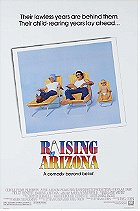 Posted : 17 years ago on 11 June 2008 05:28
(A review of Raising Arizona)
Posted : 17 years ago on 11 June 2008 05:28
(A review of Raising Arizona)
Raising Arizona is now considered a classic gem from currently-renowned filmmaking duo Joel and Ethan Coen. Now that the pair have achieved such success with their crowning jewels such as No Country for Old Men, Fargo and O Brother, Where Art Thou? to name a few, it's an interesting experience to revisit some of the earlier films created by the Coen Brothers. Taking all their succeeding films into account, Raising Arizona is a top-notch production and is unmistakably the effort of Joel and Ethan Coen. It is simply their type of movie: wildly offbeat, surreal, atmospheric and unique. However their style of humour will certainly not be appreciated by all tastes.
In this bright and moderately unconventional slapstick comedy, we are initially introduced to criminal H.I. McDunnough (Cage). H.I. (known as "Hi" among friends) is a repeat offender who is continually arrested for armed robbery. Every time Hi is arrested he meets Ed (Hunter), a police photographer. With each new arrest, the two continue developing a relationship. Hi vows to give up his life of crime when he mounts a successful marriage proposal to Ed. All is wedded bliss until it is discovered that Ed is unable to fall pregnant, and due to Hi's former persistent dedication to crime they are subsequently rejected by every adoption agency in town. Things become desperate when the inability to have children places a strain on the marriage and the relationship between Hi and Ed. They soon learn that well-known furniture tycoon Nathan Arizona (Wilson) has recently welcomed quintuplets that he feels is too much to handle. In an attempt to finally gain a baby, Ed and Hi plan to kidnap one of the babies from Nathan Arizona and pass it off as their own. When things look shaky, the happily wedded couple grab the baby and hit the road. In typical Coen Brothers style, pure mayhem and chaos ensues.
Raising Arizona is an interesting twist on your usual comedy, in fact it's one of the most inventive, original and off-the-wall comedies I've seen for years. Interestingly enough, the only wacky comedies that can compare to this film are none other than the other works of the Coen Brothers. This film is wicked fun from the get-go. It's incredibly fast-paced and well made; featuring top-notch performances, effective direction, inventive cinematography and solid directing. For a film made in the late 80s it still looks pretty damn good in terms of production values and the extremely innovative utilisation of the camera. On top of this the film is skilfully edited and contains some music that effectively sets the tone and atmosphere. The chase sequence is a particular stand-out in this film. For something this wacky, you can only find two possible people at the helm (yes, Joel or Ethan Coen...or both).
Nicholas Cage convincingly pulls off the title role. His accent always sounds genuine and he never strikes a false note. Heck, even his facial expressions towards the film's conclusion are enough to make you laugh! Holly Hunter is also quite excellent. The chemistry between Cage and Hunter is outstanding. These two are supported by an excellent bunch of actors including John Goodman, Trey Wilson, William Forsythe and Frances McDormand among others.
Overall, Raising Arizona is a very funny movie and still one of the best creations of the Coen Brothers. From a simple storyline the duo were able to create a mesmerising landscape, deft one-liners and some very off-the-wall characters. Although the script is a little clichéd and the ending is fairly standard, the whole movie is very satisfying; featuring fight scenes and chases that are skilfully choreographed and filmed, as well as being exciting and entertaining. In a nutshell: this film is great enjoyment and is destined to keep you extremely entertained.
7.9/10
 0 comments, Reply to this entry
0 comments, Reply to this entry
 Login
Login
 Home
Home 183 Lists
183 Lists 1670 Reviews
1670 Reviews Collections
Collections



